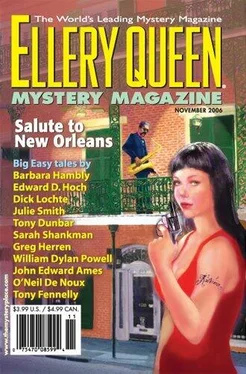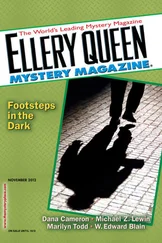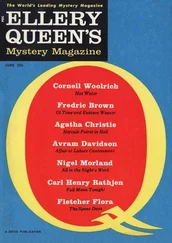John Ames - Ellery Queen's Mystery Magazine, Vol. 128, No. 5. Whole No. 783, November 2006
Здесь есть возможность читать онлайн «John Ames - Ellery Queen's Mystery Magazine, Vol. 128, No. 5. Whole No. 783, November 2006» весь текст электронной книги совершенно бесплатно (целиком полную версию без сокращений). В некоторых случаях можно слушать аудио, скачать через торрент в формате fb2 и присутствует краткое содержание. Город: New York, Год выпуска: 2006, ISBN: 2006, Издательство: Dell Magazines, Жанр: Детектив, на английском языке. Описание произведения, (предисловие) а так же отзывы посетителей доступны на портале библиотеки ЛибКат.
- Название:Ellery Queen's Mystery Magazine, Vol. 128, No. 5. Whole No. 783, November 2006
- Автор:
- Издательство:Dell Magazines
- Жанр:
- Год:2006
- Город:New York
- ISBN:ISSN 0013-6328
- Рейтинг книги:5 / 5. Голосов: 1
-
Избранное:Добавить в избранное
- Отзывы:
-
Ваша оценка:
- 100
- 1
- 2
- 3
- 4
- 5
Ellery Queen's Mystery Magazine, Vol. 128, No. 5. Whole No. 783, November 2006: краткое содержание, описание и аннотация
Предлагаем к чтению аннотацию, описание, краткое содержание или предисловие (зависит от того, что написал сам автор книги «Ellery Queen's Mystery Magazine, Vol. 128, No. 5. Whole No. 783, November 2006»). Если вы не нашли необходимую информацию о книге — напишите в комментариях, мы постараемся отыскать её.
Ellery Queen's Mystery Magazine, Vol. 128, No. 5. Whole No. 783, November 2006 — читать онлайн бесплатно полную книгу (весь текст) целиком
Ниже представлен текст книги, разбитый по страницам. Система сохранения места последней прочитанной страницы, позволяет с удобством читать онлайн бесплатно книгу «Ellery Queen's Mystery Magazine, Vol. 128, No. 5. Whole No. 783, November 2006», без необходимости каждый раз заново искать на чём Вы остановились. Поставьте закладку, и сможете в любой момент перейти на страницу, на которой закончили чтение.
Интервал:
Закладка:
Ellery Queen’s Mystery Magazine, Vol. 128, No. 5. Whole No. 783, November 2006

Libre
by Barbara Hambly

Barbara Hambly lived in New Orleans for three years with her late husband, science fiction writer George Alec Effinger. The city provides the setting for her crime fiction, the pre-Civil War Benjamin January series. What better way to begin a journey through time and the New Orleans of mystery-writing imagination than with a tale of January, former slave and sometime sleuth. Ms. Hambly’s new novel is Renfield, Slave of Dracula .
“If they fear she has been kidnapped, why not call the City Guard?” Benjamin January paused on the steps that led up to the gallery of the garçonnière, looking down at his mother in the narrow yard. He’d just returned from teaching his first piano class of the winter — new students, Americans, in the suburb of St. Mary upriver — and had been hoping to get a few hours’ nap before he had to dress up again and play for a subscription ball over on Rue Orleans. There was a saying among the musicians of New Orleans, You can sleep during Lent — which wasn’t entirely true because the holy season was dotted with “exceptions,” like Washington’s Birthday balls — but the week or two after the first frost were always the worst. He’d played for the opening of the French Opera House last night, and had gone on to provide quadrilles and pantaleones at a ball at the townhouse of a wealthy sugar planter. The sellers of fresh milk and crayfish had been beginning their morning rounds when he’d finally returned to his room above his mother’s kitchen.
Afternoon coffee with his mother’s friends was not something he wanted to deal with on three hours of sleep, particularly not when his mother had that glint in her eye.
“The City Guard.” Livia Levesque sniffed. “You know what they are, my son. If a slave disappears they’ll sober up and hunt for the thief because the owner will give them a reward. If a libre disappears—” She used the Spanish term for their people, the free people of color, though Louisiana hadn’t been a possession of Spain for thirty years now. “—they have other things to do. You come downstairs now, Ben. Poor Madame Rochier is nearly mad with fear and grief.”
That his mother was up to something — that there was something about the disappearance of eighteen-year-old Marie-Zulieka Rochier that she wasn’t going to admit in her first preemptory demand that he undertake the search — January guessed from his mother’s tone, and the way she held her head. He was forty-one, and had consciously noticed before the age of four — when she and he and his younger sister Olympe had all still been slaves on a sugar plantation upriver — all the signs when she was doctoring some unpalatable truth.
When he followed her into the dining room of the trim little cottage on Rue Burgundy he was sure of it.
Casmalia Rochier was certainly afraid, and certainly upset. But in her dark eyes and in the set of her perfect mouth, as she turned her head to reply to a question, was a world of suspicion and frozen rage.
Like January’s mother — like the other four women sipping his mother’s cook’s excellent coffee around the cherrywood table — Casmalia Rochier was a plaçee, the free colored mistress of a wealthy white man. Many years ago, according to custom, banker Louis Rochier had bought her a house and settled on her the income to raise their mixed-race children in comfort and safety. A similar arrangement between January’s mother and St-Denis Janvier, now long gathered to his ancestors, had paid for both the music lessons that led to his current profession and the medical training in France that had proved to be so completely useless the moment he returned to the United States... and, of course, had paid for this house.
A similar arrangement existed between January’s youngest sister Dominique — currently passing Casmalia the sugar — and a young sugar planter; between his old friend Catherine Clisson, who smiled a welcome to him as he came into the room, and another equally wealthy planter. An arrangement like that had provided the foundation of Bernadette Métoyer’s chocolate shop and the investments that paid for the gowns of the four daughters Agnes Pellicot was trying to “place” in arrangements of their own. Bernadette and Agnes were both angrily denouncing the New Orleans City Guards to Casmalia and barely glanced at January, but Dominique got to her feet and rustled to the sideboard for another cup of coffee for her older brother:
“You are going to find Zozo for us, aren’t you, p’tit?”
He was almost twenty years the elder and six feet, three inches tall, and smiled inwardly at being called “little one” by this piece of graceful fluff.
“If I can. Have you notified the City Guards?” He looked across at Casmalia Rochier, and her eyes ducked away from his. “They may display little interest in recovering artisans’ wives or market girls when they go missing, but they’re going to look for the daughter of Louis Rochier, even one born on the shady side of the street.”
He didn’t add, And what’s more, you know it. But it was in his eyes when she looked back at him. What is it you all aren’t telling me?
“My mother tells me Marie-Zulieka disappeared this morning. When? How? Surely she wasn’t out by herself?”
“Of course not!” Casmalia’s back went even more rigid at the suggestion. “She went to the market with her sister and Marie-Therese Pellicot. But Marie-Therese was taken ill, and Zozo left little Lucie with Marie-Therese and hurried home to fetch Tommy, our yardman, to help her get home—”
Seventeen years of living in Paris brought, Why didn’t she fetch a cab? to January’s lips, only to be reminded, with a small stab of too-familiar anger, that it was against the law for a man or woman of color to ride in a cab.
Except, of course, as the driver or as a servant perched on the box.
Catherine Clisson finished softly, “She never made it home.”
“Lucie and Marie-Therese waited for almost an hour,” added Agnes, her round, rouged face puckered with distress at the memory of her daughter’s illness and the fear that stalked every libre — the fear of kidnap by slave traders. Of being taken out of New Orleans and sold. “Finally Lucie asked one of the market women’s children to run see what was keeping Tommy.”
“That was the first I heard.”
“Is Marie-Therese all right?”
Agnes nodded, and her plump shoulders relaxed. “Just a little indisposition of the stomach, you know. I tell the girls, never buy snacks and treats from those market women unless you know them — who knows what goes into those ices? But of course girls never listen. She’ll be well for the ball at the Salle tonight.” There was an edge to Agnes’s voice. Marie-Therese had not yet found a protector after one season of attending the quadroon balls at the Salle d’Orleans, and her mother wasn’t going to let another season go by, however poorly the girl might feel.
January’s glance returned to Casmalia. “Has your daughter a lover?”
“My daughter has accepted a most flattering offer from Jules Dutuille.” The woman brought forth the name of the sugar broker with a slow flourish, like a card player spreading four of a kind beneath the noses of her enemies. But January saw the look that flashed between Catherine Clisson and his sister, and remembered hearing something — he couldn’t place what — disparaging about the man.
Читать дальшеИнтервал:
Закладка:
Похожие книги на «Ellery Queen's Mystery Magazine, Vol. 128, No. 5. Whole No. 783, November 2006»
Представляем Вашему вниманию похожие книги на «Ellery Queen's Mystery Magazine, Vol. 128, No. 5. Whole No. 783, November 2006» списком для выбора. Мы отобрали схожую по названию и смыслу литературу в надежде предоставить читателям больше вариантов отыскать новые, интересные, ещё непрочитанные произведения.
Обсуждение, отзывы о книге «Ellery Queen's Mystery Magazine, Vol. 128, No. 5. Whole No. 783, November 2006» и просто собственные мнения читателей. Оставьте ваши комментарии, напишите, что Вы думаете о произведении, его смысле или главных героях. Укажите что конкретно понравилось, а что нет, и почему Вы так считаете.












